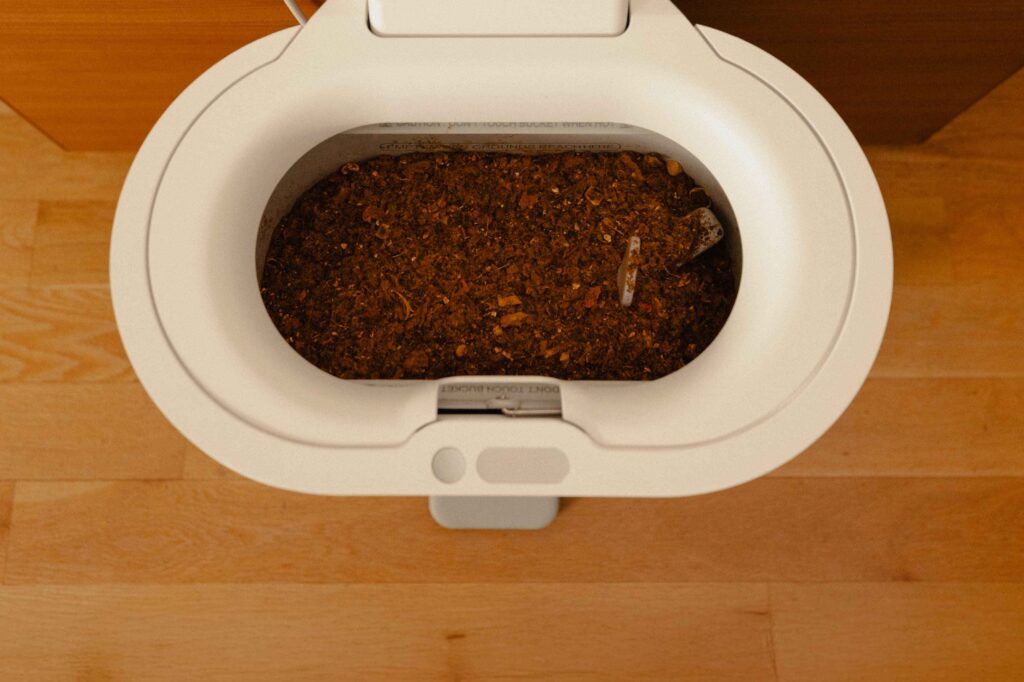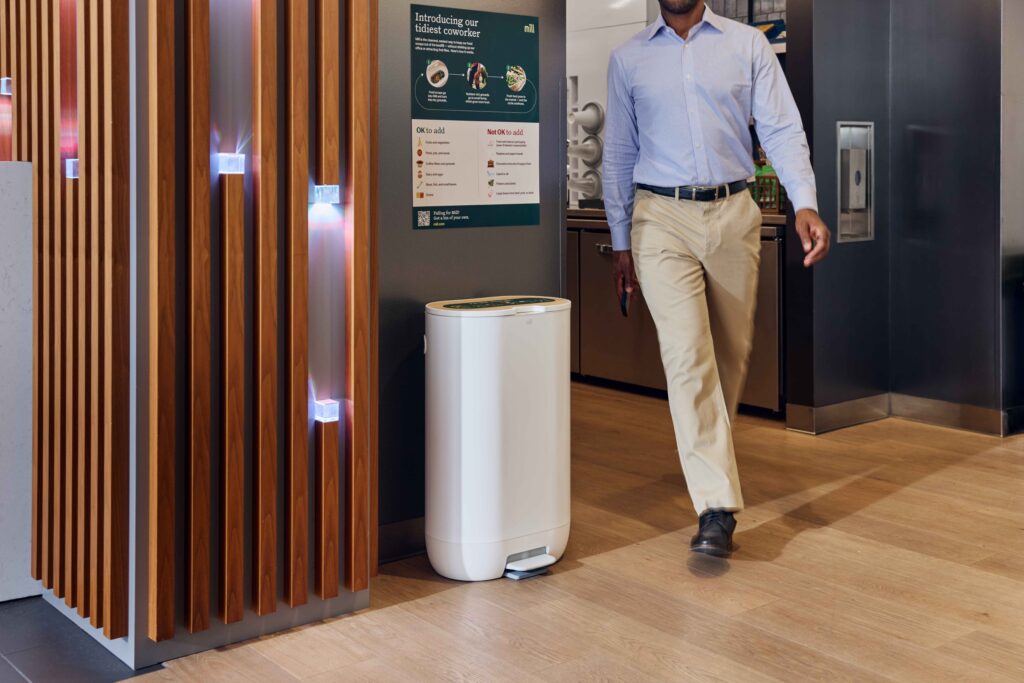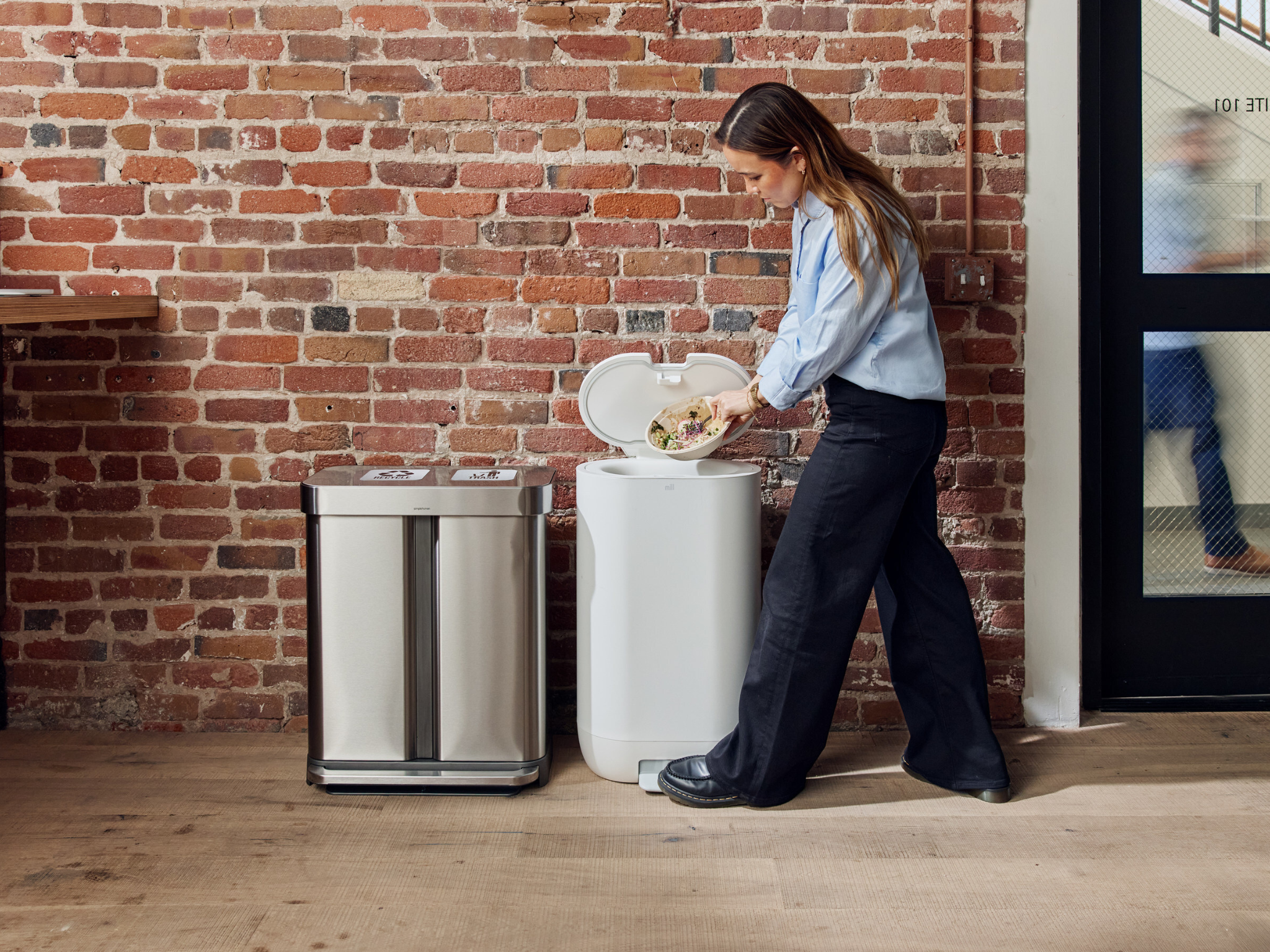5 Mins Read
Mill, a startup tackling food waste through a smart recycling bin, has reached $20M in revenue and rolled out a product designed for the workplace.
As food waste becomes a greater priority for businesses in the US, Californian startup Mill is extending its smart recycling solution to meet these needs.
The company has made its name through its at-home food waste bin, which is paired with an app and an upcycling service that turns food scraps into chicken feed. Now, it has expanded this innovation into the business sphere.
“Mill is bringing the same efficiency and sustainability that’s transformed homes into the workplace, where the opportunity for impact is just as big,” he said on social media. “This is the next step in getting food out of landfill, for good.”
Its early customers include Duolingo, Vornado Realty Trust, and the Rosewood Hotel Group. “The product helps us minimise the physical space taken up by a composting program. What really sets it apart is the real-time waste reporting,” said Curtis Nystrom, senior workplace experience manager at Duolingo.
“We have shared monthly reports out with the office and our Duos get excited to participate in the program by increasing the percentage we divert month over month. Composting gamified!”
The Mill for Workplace launch comes just as the firm has recorded $20M in revenue over the last 12 months, as co-founder and CEO Matt Rogers revealed to Axios last weel.

Mill already part of “hundreds of offices”
Since launching in 2023, Mill has acquired “tens of thousands” of domestic customers who have taken to its tech-centric approach to food waste mitigation.
Unlike most home composters, this food recycler doesn’t compost food itself, nor does it require you to have access to a garden or soil. Instead, the bin breaks down food waste into nutrient-rich grounds that can then be composted either at home or in a city scheme, or sold to farmers who can use it as feed for chickens (for which it has FDA approval).
The AI-enhanced bin is equipped with sensors and algorithms to determine the fastest runtime needed to transform the food scraps, which allows users to add food even mid-cycle and makes the entire process more energy-efficient.
The machine reduces food volume by 80%, allowing it to process around 40 lbs of wet food, meaning it doesn’t need to be emptied for weeks (activated charcoal filters take care of any odour).
This is accompanied by an app through which customers can program the grinding and track progress. The office version features the same hardware as the home bin with added software capabilities to monitor waste and emissions.
This includes a real-time analytics dashboard to help facilities and sustainability managers monitor and manage food recycler operations across their entire footprint.
On its website, Mill notes that its food recycling system and fleet software can help companies streamline operations and manage food waste at scale. “Our plug-and-play solution can materially reduce the cost and complexity of your operational, waste hauling, and pest control needs,” it says.
“By pairing the award-winning Mill food recycler with new services specifically for workplaces, we are able to simplify real estate operations, reduce costs, and comply with local requirements to keep food out of the garbage,” explained Rogers. “Mill is already deployed in hundreds of offices, data centres, retail businesses, hotels, universities, and municipal buildings nationwide.”

Helping businesses lower food waste and emissions
Mill has quickly become a cult-favourite brand thanks to its savvy tech and the expertise of its founders. Rogers is a former Apple engineer who co-founded smart thermostat company Nest, which was bought by Google in 2014 for $3.2B. His Mill co-founder, Harry Tannenbaum, also used to work at Nest, before a stint as the director of hardware at Google.
“The Mill food recycler has quickly [become] a cult-favourite experience in the home,” Rogers said, calling it the “best product” he’s ever worked on. “Now, we’re tackling food waste in workplaces, because around 30% of office trash is wasted food.”
The subscription-based service is described as a cost-effective decarbonisation strategy for companies, with Mill measuring a range of metrics to a “financially auditable reporting standard”, including the amount of food waste and emissions businesses are avoiding through the solution.
According to non-profit ReFED, 31% of the US food supply is wasted, resulting in economic losses worth $382B (1.4% of the national GDP), 4% of national greenhouse gas emissions, and 120 billion lost meals (enough to feed a third of the population for a year).

A dozen US states have already restricted or banned organic waste, while the Biden administration launched the country’s first national food waste strategy last year. Last June, the USDA, FDA and EPA all renewed their MoU with the Food Waste Reduction Alliance (FWRA), comprised of the Consumer Brands Association, FMI – The Food Industry Association, and the National Restaurant Association.
On the corporate side, at least 50 businesses have joined the US Food Loss and Waste 2030 Champions pledge, including Danone, Hilton, Starbucks, Kroger, Walmart, Unilever and Tyson Foods. Led by the USDA and EPA, the partnership replicates the national commitment to halve food waste by 2030.
In an interview with Green Queen this past February, ReFED executive director Sara Burnett said: “More businesses are setting targets, measuring, and reporting waste through pre-competitive collaborations like the US Food Waste Pact. Waste tracking and analytics software is one solution that a lot of foodservice businesses use to drive waste reductions.”
This is what companies like Mill can capitalise on. The startup has secured over $100M from investors, including Bill Gates’s Breakthrough Energy Ventures, Prelude, GV (Google Ventures), and Lower Carbon. Rogers told Axios that it doesn’t need to raise further to support the workplace launch. Other companies offering domestic food waste bins include Lomi, Reencle, and Aerobin.



